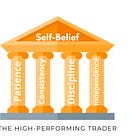Thursday Trader's Tip: The Part of You That Wants to Fail
Thursday Trader's Tip editions offer quick trading psychology advice that can be digested in 5 minutes.
Watch this edition in video at the end of the post.
— I can’t miss the trade.
— What makes you believe you can’t miss a trade? — I asked him.
— If I’m well prepared for a scenario to happen, and then it happens, and I don’t participate in it, that causes immense pain and regret.
— Are those second re-entry trades self or market-focused?
— … Okay, I get your point; they’re expectation-based. So, I’d say self-focused, maybe.
— Why, maybe?
— Well, because the initial trading idea is there, and it’s valid.
— Is the entry that you take valid according to your plan?
— No, most of the time, it’s not.
— So, how do you feel about making money on a trade that’s self-focused and not according to your strategy?
— Well, I guess putting it that way, I feel good at the moment taking the trade, but afterward, the excitement goes away, and the logic takes place. I realize it was a bad trade.
— How useful is this trade for your long-term database?
— Not useful.
— And how does that make you feel?
— That I wasted my time and money on a bad trade.
This was a chat with one of my clients — let’s call him João (the most common Portuguese name I bet most of you will struggle to pronounce).
João struggled to break the impulsive pattern, as most of you can relate to. His strongest trigger was a trading loss coming from a high expectation of what the market would do.
The firmly held expectation, when invalidated by the market, together with a financial loss, would trigger another side of João and make it really (but really) difficult for him not to screw up. He'd almost always take a quick re-entry stuck in the original trading idea.
— For more than you hate your impulsivity, a part of you loves it—I told him—and that’s why you’re not succeeding in breaking it.
What looks like a great idea in the short term often plays against our long-term goal, resulting in a loss of time and money.
We typically think of trading patterns we want to break hateful and don’t understand why we keep repeating them.
That’s because a part of you, deep down, loves and wants to keep that problematic pattern.
How can you stop something you deeply love? You don’t. And you won’t until you realize what part of you that is.
For João, the belief that he couldn’t succeed without missing a trade he had high expectations for was the part of himself holding the problematic pattern.
What is that part for you? The part that’s pulling the tide in the opposite direction? I invite you to find out!
Once you spot the part of you that wants to keep your worst patterns, then it becomes easier to prompt a change.
Most of the time, it's hidden in a limiting belief or expectation of yourself, trading, or the markets. That’s the part that needs remodeling.
More on how you remodel it is the topic for next week’s post. Stay tuned!
Peaceful trading,
Sara
Enjoyed this post? Give the paid plan a try:
And don’t forget to click the ❤️ button!
Don't miss out on this week's edition in video format:
Related reads:




Sara - I have been working on self feedback to give me early warning of tendencies to overtrade and make impulsive trades. I can report great success this week ! My trading journal warned me that Friday's were my worst days to trade. My self feed back told me that my strategies were not in sync with the price action. I sat back and have been watching not trading today as my internal warning signs were telling me not to trade! Many thanks for all your work it is truly making a difference for me!
Cool thoughts here. It's true that many aspiring traders wish that they could just trade on impulses -- like some spidey-sense that "this trade will be a winner" rather than placing trades that stick to a trading plan. Successful trading needs to be more disciplined than that.